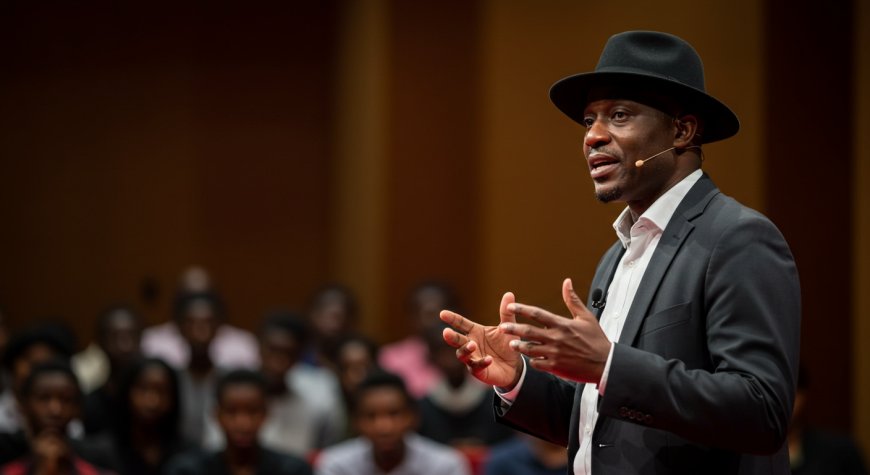The Intersection of Integrity and Loyalty: Building Sustainable Success in Business and Leadership
Integrity and loyalty are the cornerstones of sustainable success in business, leadership, and mentorship. Dr. Ohio O. Ojeagbase, FICA, FIDR, calls for ethical business practices, honoring obligations, and upholding mentorship values to build lasting legacies of trust and excellence.

In the spirit of integrity-in-business culture movement and sustainable business governance, I, Dr. Ohio O. Ojeagbase, FICA, FIDR, call upon Corporate Nigeria and citizens of Africa dissent to uphold the highest ethical standards in business, honoring commitments to creditors, partners, and all those who have played a role in their business or career growth, for no enterprise thrives in isolation, and loyalty to obligations is the foundation of sustainable success; let businesses resist the temptations of financial misconduct, choosing instead to build legacies of trust, credibility, and excellence, because true prosperity is not just about profit but about the character that sustains it; to the Special Fraud Unit (SFU), I commend your relentless efforts in combating financial fraud and urge you to intensify collaboration with stakeholders in safeguarding businesses from debtors and fraudsters who seek to destroy the hard-earned successes of legitimate enterprises; together, let us fortify the economic ecosystem, ensuring that diligence, honesty, and responsibility remain the pillars upon which Nigeria’s corporate future is built, for in integrity, we find longevity, in loyalty, we secure prosperity, and in justice, we uphold the sanctity of commerce.
HAPPY BIRTHDAY DR. OHIO O. OJEAGBASE FICA, FIDR FROM PROBITAS REPORT BOARD
In the same vein, let every mentee who has risen through the guidance, wisdom, and sacrifice of a mentor—whether in business, politics, or leadership —never forget the bridge that lifted them to success, for true greatness is marked by gratitude, not ingratitude; by humility, not arrogance; it is dishonorable to turn against those who have invested in your growth, shaped your destiny, and positioned you for opportunities that once seemed unattainable; no matter how high you rise, remember that loyalty is the hallmark of character, and to betray a mentor who has made you better, not bitter, is to erase the honor of your own journey; stay true, stay faithful, and resist the fleeting intoxication of pride, for the hands that lifted you yesterday must never be the hands you disregard today — for in the circle of life and leadership, what you sow in loyalty, you will reap in lasting legacy.
BANK NEWS: Zenith Bank Profit Soars by 53% to N1.032trn, Declares Dividend
Why Integrity Must Anchor Loyalty
Integrity serves as the moral compass that guides loyalty. When integrity is present, loyalty becomes purposeful and principled. Instead of blindly following their mentors, mentees evaluate actions based on ethical considerations and the greater good. This ensures that loyalty does not devolve into complicity but instead reinforces positive behaviors and outcomes.
True mentorship thrives on mutual respect for shared values and principles. Mentors who genuinely care about their protégés’ growth will encourage them to think critically, challenge assumptions, and act with integrity—even if it means disagreeing with the mentor’s views or decisions. Similarly, mentees should approach their mentors with honesty and courage, offering constructive feedback when necessary and refusing to participate in activities that violate their conscience.
Consider the following examples:
-
An employee notices discrepancies in financial reporting at work. Despite pressure from their mentor (a senior manager) to overlook these issues, they report the matter to the appropriate authorities, guided by their commitment to transparency and accountability.
-
A politician openly questions a policy proposed by their mentor because it disproportionately disadvantages vulnerable communities. By doing so, they uphold the principles of equity and justice while still respecting their mentor’s overall contributions.
In both scenarios, integrity ensures that loyalty remains constructive rather than destructive.

The Role of Principles in Mentorship
At its core, mentorship is about imparting wisdom, fostering growth, and creating opportunities for success. However, these objectives cannot be achieved without a foundation of principles. Both mentors and mentees must align themselves with universal values such as honesty, accountability, empathy, and fairness. These principles serve as guardrails, ensuring that mentorship relationships do not stray into unethical territory.
When mentorship is based on principles:
-
Mentors Lead by Example: Effective mentors model ethical behavior and decision-making, inspiring their mentees to adopt similar practices.
-
Mentees Think Critically: Protégés learn to assess situations objectively, weighing the merits of actions against their alignment with core values.
-
Relationships Are Built on Trust: Both parties know that their bond is rooted in mutual respect for shared ideals, not blind allegiance to one another.
Conversely, when mentorship lacks principles, it risks becoming transactional or self-serving. Mentees may prioritize gaining favor over developing character, while mentors may exploit their influence to advance personal agendas. Such dynamics ultimately weaken the relationship and diminish its impact.
- The Need For Private Investigators To Review AMCON'S Operations Over The Last Decade
- How Non Payment Of Your Debt Affect Your Integrity
- Strengthening Fight Against Financial Fraud in Nigeria
- Understanding The Dangers of Financial Fraud And How To Stay Clean
How to Cultivate Loyalty with Integrity
To avoid the pitfalls of blind loyalty, both mentors and mentees must actively cultivate integrity in their relationships. One key way to achieve this is by encouraging open dialogue. Mentors should create safe spaces where mentees can express differing opinions without fear of retribution, while mentees should feel confident in seeking clarification and asking tough questions. Ethical reflection is also crucial—both parties must consistently evaluate whether their actions align with their values to ensure decisions are guided by principles rather than convenience.
Setting clear boundaries is another fundamental aspect of maintaining integrity in mentorship. Mentees should establish early on that they will not compromise their ethics for the sake of loyalty, and mentors should respect these boundaries, encouraging independent thinking. Additionally, the focus of mentorship should always be on growth rather than favor-seeking. When mentorship is centered on the mentee’s holistic development rather than securing personal benefits, both mentor and mentee can sustain a relationship built on mutual respect and ethical guidance.
A crucial element in fostering integrity within loyalty is the recognition of courageous actions. Mentees who stand up against unethical practices or advocate for change should be commended by their mentors, reinforcing the value of principled behavior. When loyalty is rooted in integrity, it promotes open dialogue, critical thinking, and ethical decision-making. Without this balance, mentorship risks becoming a mechanism for blind followership, leading to ethical compromises that ultimately harm individuals and institutions.
Striking the Right Balance
Loyalty without integrity is dangerous—it can result in misplaced allegiance, moral compromises, and a culture where people follow orders without question. However, integrity without loyalty can also lead to betrayal, where mentees abandon or even undermine those who have helped them when it is convenient. The true test of mentorship is whether it fosters a commitment to shared values, mutual respect, and the courage to stand for what is right. When properly aligned, loyalty and integrity create mentorship relationships that inspire ethical leadership, promote personal and professional growth, and leave a lasting legacy.
Leaders who build their success on loyalty with integrity honor their mentors while upholding their moral values. They acknowledge contributions, uphold agreements, and foster continuity in leadership, governance, and business. By striking the right balance, mentorship becomes a powerful force that nurtures ethical leadership, ensuring that the values of integrity and loyalty endure across generations.
ADVERT:
Joshua and Moses Biblical Perspective: A Timeless Blueprint for Loyalty, Integrity, and Legacy in Mentorship
The relationship between Joshua and Moses is a timeless example of mentorship built on loyalty, integrity, and the seamless continuity of vision. Joshua never sought to undermine Moses or challenge his authority; instead, he faithfully upheld the foundation laid by his mentor, ensuring a smooth transition of leadership for Israel. His journey from being a dedicated servant to a divinely appointed leader reveals the essence of faithfulness in mentorship and the reward of unwavering commitment to a leader’s vision.
Before Joshua assumed leadership, he diligently served Moses, embracing the role of a loyal assistant and learning under his guidance. He never positioned himself as a rival but as a trusted aide who walked in obedience. When the time for transition came, Joshua did not seize leadership for himself; rather, he was appointed by Moses under divine instruction. His elevation was a testament to the principle that true promotion is birthed out of service and not rebellion. Joshua’s life teaches that those who remain faithful in service will be honored in due season.
One striking quality of Joshua’s leadership was his commitment to the vision of Moses. Many successors attempt to rewrite the legacy of their mentors to establish their own identity, but Joshua did not deviate. He carefully followed the instructions left behind, ensuring the fulfillment of God’s mandate. The Lord specifically commanded him to obey all the laws given to Moses without turning to the right or left, reinforcing that success is found in continuity rather than in deviation. Joshua completed the work of Moses, ensuring that nothing was left undone and demonstrating that true mentees finish, rather than dismantle, the assignments entrusted to them.
Despite being a bold and courageous leader, Joshua did not abandon the values instilled in him by Moses. His leadership style reflected wisdom, patience, and dependence on God, mirroring the principles of his mentor. Because of this, Israel remained faithful to God even after Joshua’s death—a testament to the lasting impact of mentorship done right. Joshua’s ability to sustain the spiritual and national stability of Israel was rooted in his unwavering dedication to the teachings of Moses.
The story of Joshua and Moses offers key lessons on loyalty and integrity in mentorship. Faithfulness precedes promotion—Joshua did not seek to claim power for himself but was lifted by divine appointment. True mentees complete the work of their mentors rather than destroying it for personal ambition. Leadership is about stewardship, not self-glorification. Additionally, God honors those who honor their mentors. Joshua’s faithfulness led to divine exaltation, proving that loyalty attracts favor while disloyalty invites disgrace.
This principle extends beyond biblical history into the realms of business, politics, and leadership. Many individuals rise under the influence of great mentors but later attempt to erase their legacy, forgetting the structures that paved the way for their success. Honoring one’s mentor ensures stability, continuity, and long-term impact. Whilst rebellion may bring temporary gain, history remembers those who remain loyal and build upon what they have inherited rather than those who sabotage their predecessors.
Ultimately, the mark of a true mentee is loyalty, integrity, and the commitment to preserve and advance a mentor’s vision. Joshua proved this by faithfully executing Moses’ mission without succumbing to the temptation of personal ambition. In every sphere of leadership—whether in politics, business, or governance—mentorship is not merely a stepping stone to power but a sacred trust that demands honor. A mentee with both loyalty and integrity ensures that the relationship remains mutually beneficial, honorable, and sustainable, laying a solid foundation for generational success and legacy.
To the next generation of professionals, leaders, entrepreneurs, and visionaries under 50—resist the temptation of shortcuts and personal gain at the expense of integrity. In a world where convenience often overshadows principles, be the generation that upholds values, especially integrity in business. Seek knowledge, challenge outdated norms, and stand firm in your convictions, even when doing so is difficult. Yet, in your pursuit of excellence, do not neglect the honor and wisdom of those who came before you—whether they are fathers, mentors, or trailblazers who laid the foundation for your success.
Great leaders do not merely follow; they shape the future by blending the wisdom of the past with bold innovation. Your legacy will not be defined by blind loyalty but by principled leadership, vision, and a steadfast commitment to what is right. The future belongs to those who dare to uphold truth, even when it is inconvenient, and who forge paths of excellence despite distractions or opposition. Let your integrity be your compass, guiding you toward lasting impact and true success.
Kindly share this story:
Contact: report@probitasreport.com
Stay informed and ahead of the curve! Follow The ProbitasReport Online News Report on WhatsApp for real-time updates, breaking news, and exclusive content especially when it comes to integrity in business and financial fraud reporting. Don't miss any headline – and follow ProbitasReport on social media platforms @probitasreport
[©2025 ProbitasReport - All Rights Reserved. Reproduction or redistribution requires explicit permission.]
What's Your Reaction?







































































































